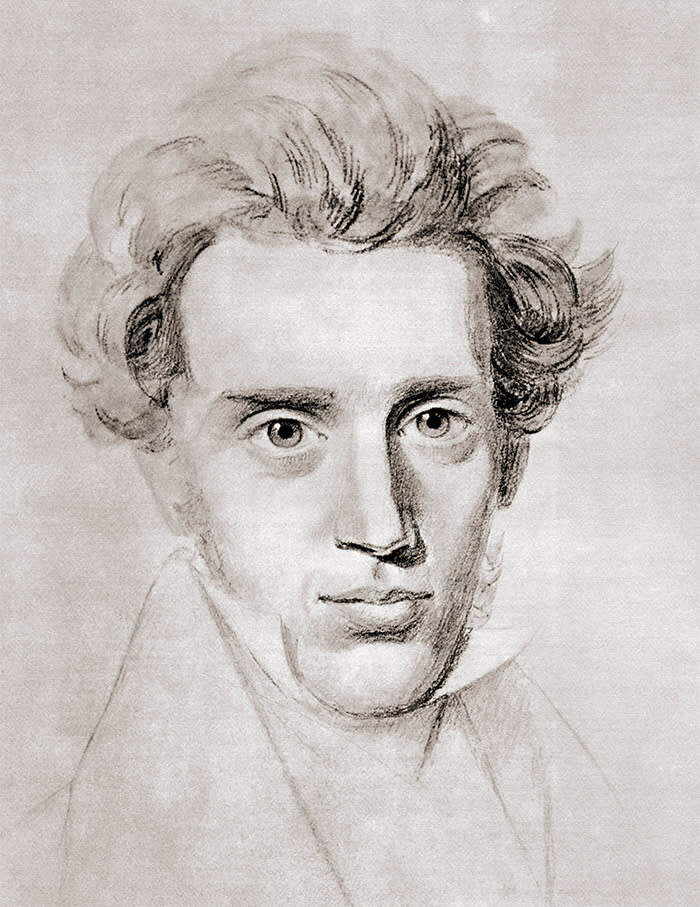Zadie Smith and Kierkegaard
Last week I shared a well-worn story of Miles Davis's advice to John Coltrane on "how to stop" the flow of his musical ideas and posited that the more relatable skill is "how to start" the flow. I hope you can see yourself starting a new subject of practice (musical or otherwise). If you can see yourself taking those first steps to becoming a practicing musician (taking your instrument out of the case, putting it together) where do you see yourself doing it (or where do you do it if you're already practicing)? Zadie Smith's recent collection of essays, Intimations (public library), contains a very deep explanation on how to develop the mental space to create life, work, and art in less-than-ideal circumstances. As part of the lead-off essay "Peonies", she struggles to pin down why it is that she doesn't think of writing as being creative, but rather controlled:
"The part of the university in which I teach should be called the Controlling Experience Department. Experience--mystifying, overwhelming, conscious, subconscious--rolls over everybody. We try to adapt, to learn, to accommodate, sometimes resisting, other times submitting to, whatever confronts us. But writers go further: they take this largely shapeless bewilderment and pour it into a mold of their own devising. Writing is all resistance. Which can be handsome, and sometimes even a useful activity--on the page. But, in my experience, turns out to be a pretty hopeless practice for real life."
This resistance is something I've noticed to be present in almost all of my meaningful musical practice. If I'm doing my job correctly, the material I'm choosing to spend time working on are things I cannot currently do and therefore something to get under my control. I need to have firmly established boundaries that include specific goals (learning tunes for a gig that's a month away, playing a transcription up to tempo), time constraints to help with focus (haha, I'm lucky to get two 30-minute chunks a day right now), and progress that I can measure (I log practice tempos, notes about technical issues and breakthroughs, and record regularly to keep myself honest). Most of my practice is about establishing control over vocabulary and concepts that provide resistance. When you lean into the resistance during your practice (something Steven Pressfield writes about extensively in The War of Art) you lay the foundation to be creative and interactive at a later point during rehearsal, performance, (ideally with other like-minded musicians), as well as practice where you specifically work on being creative and not controlling. Smith draws on a parable by Danish philosopher Søren Kierkegaard to further explain her thoughts:
"The Dog Kennel By the Palace"
To what shall we compare the relation between the thinker's system and his actual existence?
A thinker erects an immense building, a system, a system which embraces the whole of existence and world-history etc. --and if we contemplate his personal life, we discover to our astonishment this terrible and ludicrous fact, that he himself personally does not live in this immense high-vaulted palace, but in a barn alongside of it, or in a dog kennel, or at the most in the porter's lodge. If one were to take the liberty of calling his attention to this by a single word, he would be offended. For he has no fear of being under a delusion, if only he can get the system completed... by means of the delusion.
What type of space do you practice in? This is a question that relates more to the mental headspace than the physical location but you can build your ideal "location" to be a palace where you're comfortable focusing on control and creativity. I've been very encouraged by my current physical and mental location when I practice but it's taken some experimentation and dedication to doing it every day. Sometimes having that 15-60 minutes a day where I'm (mostly) able to control what's happening makes all the difference. Then I go back out in the world and try to get by.
We'll talk improvisation with Keegan-Michael Key and Mike Birbiglia next week. Read or listen to Intimations and The War of Art in the meantime.


